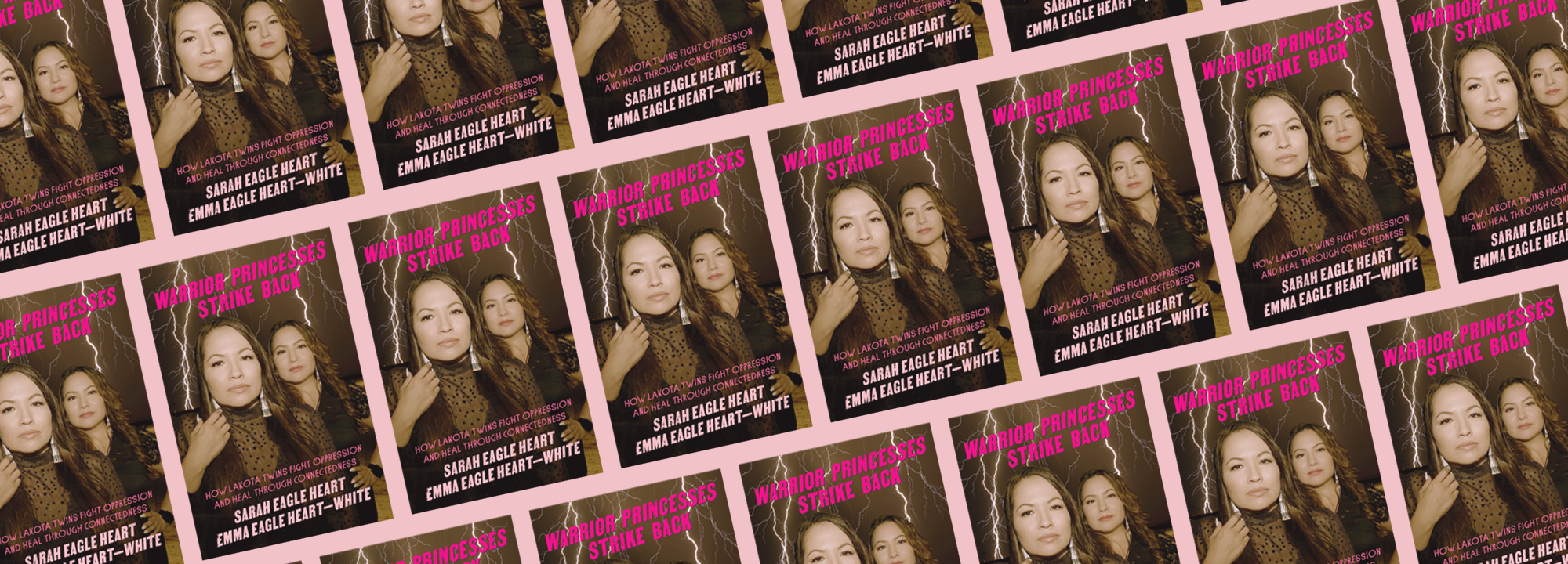Read an exclusive excerpt from Warrior Princesses Strike Back!
Pine Ridge Indian Reservation is home to the original people of this land, yet it is also one of the poorest communities in America. Through intimate and vulnerable memoir, Lakota twin sisters Sarah Eagle Heart and Emma Eagle Heart-White recount growing up on the reservation and overcoming enormous odds, first as teenaged girls in a majority-white high school, and then battling bias in their professional careers. Woven throughout are self-help strategies centering women of color, that combine marginalized histories, psychological research on trauma, and perspectives on “decolonial therapy.” Through the lens of Indigenous activism, the Eagle Hearts explore the possibility of healing intergenerational and personal trauma by focusing traditional strategies of reciprocity, acknowledgement, and collectivism.
Keep scrolling to read an exclusive excerpt of Warrior Princesses Strike Back, which is now available wherever you get your books (including here!)
7 WAYS TO BE AN ALLY
For many years, we didn’t tell this story because it was too painful to reflect on how the community harmed us as young women with their ignorance. Today we tell this story because so many are inspired by it, and our intention is to help others find healing. Many Native Americans suffer in silence due to historical trauma. Many non-Natives have no idea about the actual physical harm they are causing by refusing to listen. We can move toward healing to free ourselves from pain and suffering. We can all heal our historical trauma so our children and the next seven generations do not have to suffer. It is not easy; it is a process to work through each aspect of healing, individually and collectively.
#1. Learn about your local and regional tribal nations
Spend time in your local tribal community, getting to know the people by attending local events like wačhípis, or powwows, where everyone is welcome. Learn about regional tribal history and the contemporary issues that local tribes are facing, as well as the story behind each type of dance style.
Share truth. Amplify and sponsor educational events in your workplace and community, like the blanket exercise, which educates about history and Indigenous issues.
Don’t expect immediate acceptance. Most tribes have been decimated by outsiders through genocide, land and resource scalping, or their elders were forced to be colonized at Indian boarding schools. It will take time to build trust.
Acknowledge when you don’t understand and ask questions with humility.
Advocate for Indigenous worldviews, Indigenous rights, and Indigenous equity at the community, local, state, national, and international levels. Find local organizations working on these issues and include them in ongoing meetings to build lasting relationships.
#2. Support truth, healing, and justice in your local community and beyond.
We need justice for the dead. Many churches are now finding hundreds of unmarked graves of children who died far away from their families, often abused and neglected. Support repatriation of their graves and the return of their bodies to their tribes for sacred burial by giving to local Native-led organizations.
We need justice for the living. Our elders now have suffered sexual and physical abuse, many times at the hands of trusted religious leaders. Some churches actively lobbied for twenty-year statute of limitation laws in every state to avoid being sued. Our elders are only now able to talk about the suffering they endured. Advocate for overturning these statutes of limitations.
#3. Rethink patriarchal and linear structures by understanding how colonization is embedded in laws. Ensure that our perspectives and voices as the original people of this land are at the table, from your local community to regional and national levels. We are not tokens: invite more than just one of us for representation.
#4. Identity is complicated and complex, but don’t appropriate our culture. If you did not grow up with a specific tribal worldview and/or with the community, there are safeguarded cultural protocols and understandings only taught by tribal leaders. You are not honoring us by distorting our cultural and ceremonial practices.
#5. Give land back. Many countries were founded by stealing our resources and claiming our sacred ancestral lands.
You, as an individual, can give land back to the tribes after you pass on.
You can also advocate for your religious community to give stolen land back, especially if it’s not being used!
#6. Don’t just give us a seat at the table; give us equity everywhere. Indigenous voices have been silenced, invisibilized, and killed since the founding of countries.
Give us our equity in amplification now! The world needs our collective healing and thinking now.
Partner with Native Americans to help us tell our stories. Allow us to lead.
#7. Share land acknowledgments by honoring your tribe or tribes in your community at every gathering, even at the end of films in end titles. If everyone learns how to share this historical connection to the land they live on, then honoring Native people will be normalized and racism will not live on generationally.
Encourage your local retreat center to give Indigenous groups at least 20 percent to 30 percent of space now.
Encourage your local radio and television stations to give at least 20 percent to 30 percent of airtime now.


